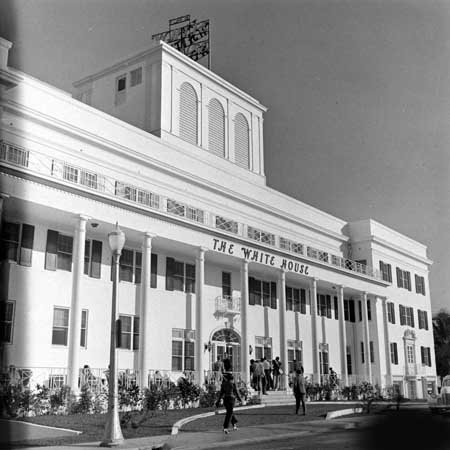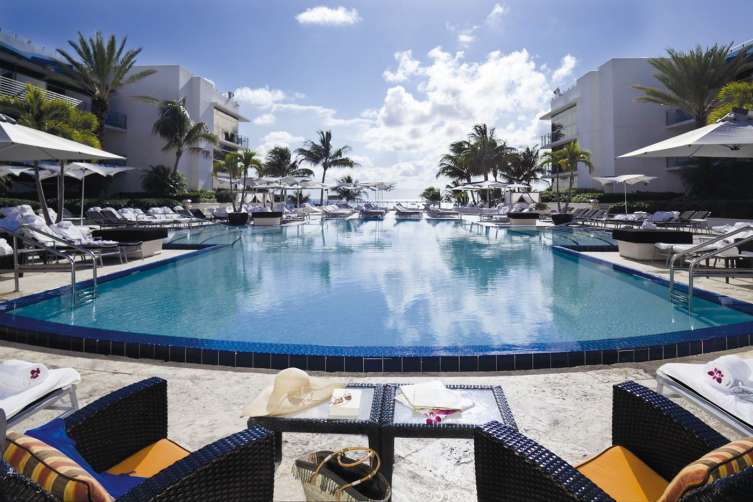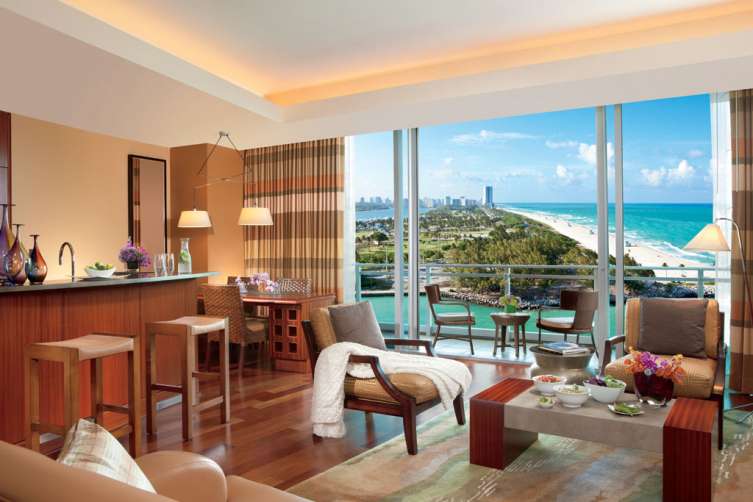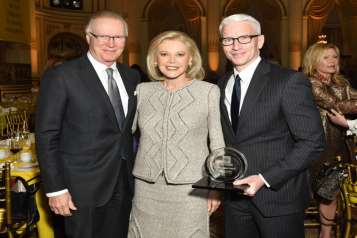
Lionstone Development is celebrating 50 years this month. In case the company’s name doesn’t ring a bell, two properties they own, Ritz-Carlton South Beach and Ritz-Carlton Bal Harbour, will. Lionstone is a family-owned company run by Diego Lowenstein, who serves as CEO, and his father, Alfredo Lowenstein. Haute Living got the chance to sit down with the father-and-son duo ahead of their golden celebration. “We named the company Lionstone because in German, ‘löwen’ means lion and stein’ means stone, so Lionstone is Lowenstein,” explains Alfredo from a settee in one of Ritz-Carlton South Beach’s newly renovated suites. The stone lion is more
than just a name. It has been an icon to the company, giving them courage to take risks and the stone fortitude to weather any ups and downs. Indeed, the elder Lowenstein says the 50th anniversary means one thing to him: “survival.”
 The Lowenstein family’s journey to Miami in the 1960s came as a result of the general malaise felt in Argentina after the Argentine Revolution and numerous coup d’états left the country a difficult place to do business. So when they arrived in Miami, the Lowensteins sought to diversify their holdings with more stable ground in Miami. In 1966, Lowenstein purchased The White House Hotel, which was their first Miami Beach investment. They went on to acquire a 35,000-square-foot retail building, rental apartments and the Copacabana Hotel, which have since been sold. Later, in 1971, they bought the DiLido, which was designed by Morris Lapidus, the Seville Beach Hotel (now the Edition). He still kept one foot in Buenos Aires where he developed buildings, restaurants and the largest shopping center in the city in the ’80s and ’90s. It was during this period in 1989 that Diego’s mother and Alfredo’s wife of 50 years, Diana Lowenstein, opened the eponymous Diana Lowenstein Gallery. The gallery has occupied many different locations and is still one of Miami’s top galleries today, and has represented over 40 international artists.
The Lowenstein family’s journey to Miami in the 1960s came as a result of the general malaise felt in Argentina after the Argentine Revolution and numerous coup d’états left the country a difficult place to do business. So when they arrived in Miami, the Lowensteins sought to diversify their holdings with more stable ground in Miami. In 1966, Lowenstein purchased The White House Hotel, which was their first Miami Beach investment. They went on to acquire a 35,000-square-foot retail building, rental apartments and the Copacabana Hotel, which have since been sold. Later, in 1971, they bought the DiLido, which was designed by Morris Lapidus, the Seville Beach Hotel (now the Edition). He still kept one foot in Buenos Aires where he developed buildings, restaurants and the largest shopping center in the city in the ’80s and ’90s. It was during this period in 1989 that Diego’s mother and Alfredo’s wife of 50 years, Diana Lowenstein, opened the eponymous Diana Lowenstein Gallery. The gallery has occupied many different locations and is still one of Miami’s top galleries today, and has represented over 40 international artists.“Miami has gone through many different eras,” says Diego. “The era of the ’50s and ’60s was one of great success, and the doom and gloom era of ’70s and ’80s.” During this period, “everybody saw Miami through the series Miami Vice,” says the elder Lowenstein. “It was very unsafe. There was nothing here.” The properties—and the family—made it through the period intact, and benefited from the South Beach ’90s resurgence in popularity. “Real estate values changed in a big way then,” says Diego. “The strength of those years gave us the opportunity to change this property, which was the DiLido Hotel, a three-star hotel like most of the hotels here at the time, into a luxurious Ritz-Carlton.”
The completely renovated hotel opened with a bang in 2004 and represented a new type of Ritz-Carlton property. It was a more casual version of luxury, quite a bit less stuffy than people had associated with the brand at that time. “The millennial generation looks at luxury in a very different way than I do, and my father,” says Diego. “There is a very old-world, very European approach to luxury, and there is a newer approach. As a hotel owner and manager, you want to bring customers from all age groups, so you have to figure out how to do that. “The design we put into this hotel was not the traditional idea of luxury. It was pretty different for Ritz-Carlton at the time,” he adds. There is a lot of contemporary art hanging on the hotel’s walls thanks to Diana. “My mother is dedicated to curating them in a special way. She understands the environment and nurtures a lot of local artists.” The art and design was all part of the equation that went into the developer’s own style of “unbuttoned elegance,” which works well with the beachfront location and ethos of South Beach. “Ifyou can deliver luxury in a laid-back and comfortable environment for relaxing, you’ve hit it right,” says Alfredo, nodding in agreement with his son. Like all the great hotels of the world, the property is in a constant state of improvement.
In 2012, the rooms underwent a significant renovation and redesign of all 375 of their guest rooms and suites. “When you have a property that generates the occupancy we generate, it has to be done often. Miami is not an easy environment either—the salt, the wind, the sand—it’s a continuous, revolving thing,” explains Diego. Indeed, they have another big capital improvement debuting later this month—a brand-new spa. “We just spent a significant amount of money to redo it,” Diego says. The new, $3 million spa has been totally redesigned with bigger and better saunas, steam rooms and relaxation areas. The company’s reputation only grew stronger with the opening of the EPIC with partners CMC. The property opened in January of 2009, in the depths of the recession and a most difficult time to do business. Although they have sold it, the high-quality hotel, run by Kimpton Hotels, was and still is a resounding success. It was rated the number one hotel in Miami for 2016 by Condé Nast Traveler and has received numerous awards and accolades. EPIC has defied Miami’s fickle flavor-of-the month ethos for a few reasons. It boasts chic, minimal design that doesn’t look like any other hotel in town, the hotel’s service is on-point, it’s a waterfront property and it has Zuma, which has managed to stay on top of the downtown restaurant game since opening. “I think it’s really well-designed, and definitely one of the most profitable ventures to come out of that cycle, so there is a lot to say about that venture,” says Diego.
Their newest Miami property is the Ritz-Carlton in Bal Harbour, which they acquired in 2014. They spent an additional $5 million on the
relatively new, former ONE hotel to elevate with new facilities and restaurants. The hotel boasts a stunning beachfront location, sleek contemporary design and top-notch amenities.
Now, Lionstone is on to even more projects, including a partnership with Virgin Hotels, which opened their first U.S. property in Chicago. “We are one of the founding partners of Virgin Hotels, so we are owners of the management entity,” says Diego. Lionstone has many different “silos” (as its CEO calls them) including the Miami Ritz-Carlton properties, new Virgin Hotels and property and asset management. The family has a new project underway in Florence, independent of Lionstone. Clearly, Italy has captured the imagination of both Lowensteins. The future destination resort rests on 1270 acres purchased by the family to create a unique retreat in the first castle of the Medici family.
But, it will be awhile before that amazing and historic hotel will be unveiled. In the meantime, the family is celebrating the 50th anniversary of Lionstone Development not just with a party at the Ritz-Carlton South Beach, but also with some philanthropic deeds. Diego explains, “We have over 2,000 people working for us, but this is a family business, so a lot of the things we hold near and dear are charities that have to do with education and children. For our 50th, we decided to sponsor 50 mentorship programs for Big Brothers Big Sisters. It’s one of the charities that the family has been involved with. It’s a great way of giving back, because at the end, you’re giving a young people in their formative years, role models. In the end they will help make this community a better place, and we love that.”






















